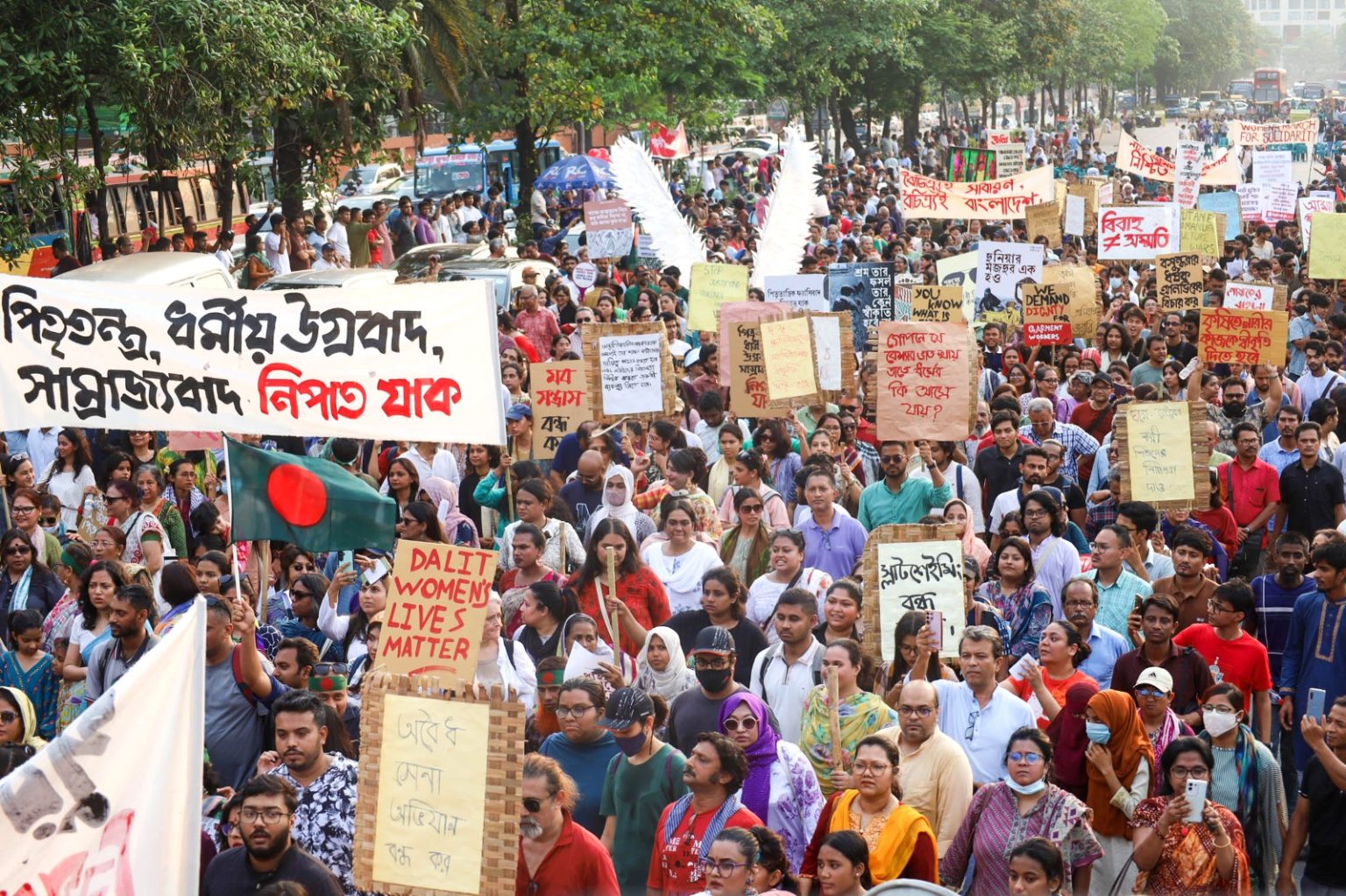Thousands of people, mostly women, rallied in Dhaka on Friday, calling on the interim administration to take effective measures to ensure the protection of women and marginalized communities across Bangladesh.
Organized under the banner Moitree Jatra (March for Solidarity), the demonstration was a unified call for gender equity and justice, drawing participants from various walks of life, including students, teachers, workers, cultural activists, and professionals.
Organised in front of the Jatiya Sangsad Bhaban on Manik Mia Avenue, the march participants carried placards with powerful messages such as “No means no,” “It’s never about clothes or belief, just weak men quaking, seeking relief,” and “Resist marital rape,”.
They also marched through the avenue chanting slogans like “We demand equality,” “From hills to plains, the fight must be the same,” and “We want to fight, fight to survive.”
The rally was seen as a direct response to recent demands by several Islamic parties to scrap recommendations made by a government-assigned reform commission.
These recommendations include equal property rights for Muslim women — a proposal that has drawn opposition from conservative religious groups, who earlier this month urged the government to reconstitute the commission with representatives from Islamic scholars.
Friday’s event called on the interim government, led by Chief Adviser Muhammad Yunus, to confront misinformation and religious incitement that threaten to derail progress on gender equality.
In a declaration read out by three women — all family members of martyrs from last year’s popular uprising that led to the ousting of former prime minister Sheikh Hasina — the rally demanded concrete steps to safeguard the rights of minority communities and protect women from targeted violence and systemic discrimination.
“We came here in response to the call from women to let everyone know that we are united on these issues,” said Rehnuma Ahmed, a former faculty member at Jahangirnagar University.
“There is no anger or hostility here — just solidarity and determination.”
Activist Nazifa Raidah echoed this sentiment.
“After the fall of the fascist regime, we hoped such rallies wouldn’t be necessary. But women continue to face harassment, public beatings, and threats from mobs seeking to confine them to silence and subjugation. We are here to reclaim our dignity and demand equity,” she said.
The declaration emphasized the constitutional obligations of the interim government to act decisively against gender-based violence, misinformation surrounding the Women’s Reform Commission, and the misuse of religious narratives as tools of fear.
It further urged political actors, whether through electoral pledges or reformist platforms, to clearly state their positions on the rights of women, workers, and religious, ethnic, linguistic, and gender minorities, and to commit to ensuring their full political, economic, and personal freedoms.
Key demands included the nomination of at least 33% women candidates in the upcoming elections, in line with population ratios, and immediate improvements in education, healthcare, and socio-economic opportunities for women and marginalised groups.
The declaration also issued a strong warning: “Attempts to perpetuate violence and discrimination against women will not be tolerated. We reject any effort to use culture or religion as instruments of repression.”
“Our culture, religion, and history are rich in diversity. We will not let narrow interpretations silence this plurality.”
Calling on all women’s organizations to vigilantly monitor the policies of the government and political parties, the declaration concluded with a resolute pledge: “We will dismantle the power structures that sustain oppression. We will not give up on our dream for a just Bangladesh — nor on the struggle to achieve it.”
Many organizations expressed solidarity with the movement, including the Bangladesh Student Union, Revolutionary Student Unity, Socialist Student Front, Women’s Liberation Centre, Udichi Shilpigoshthi, Hill Women’s Federation, Indigenous Union, Garments Workers Liberation Movement, Science Movement Platform, Socialist Women’s Forum, Bangladesh Women’s Alliance, Women Solidarity, Student Front and the Workers’ Rights Movement, among others.


